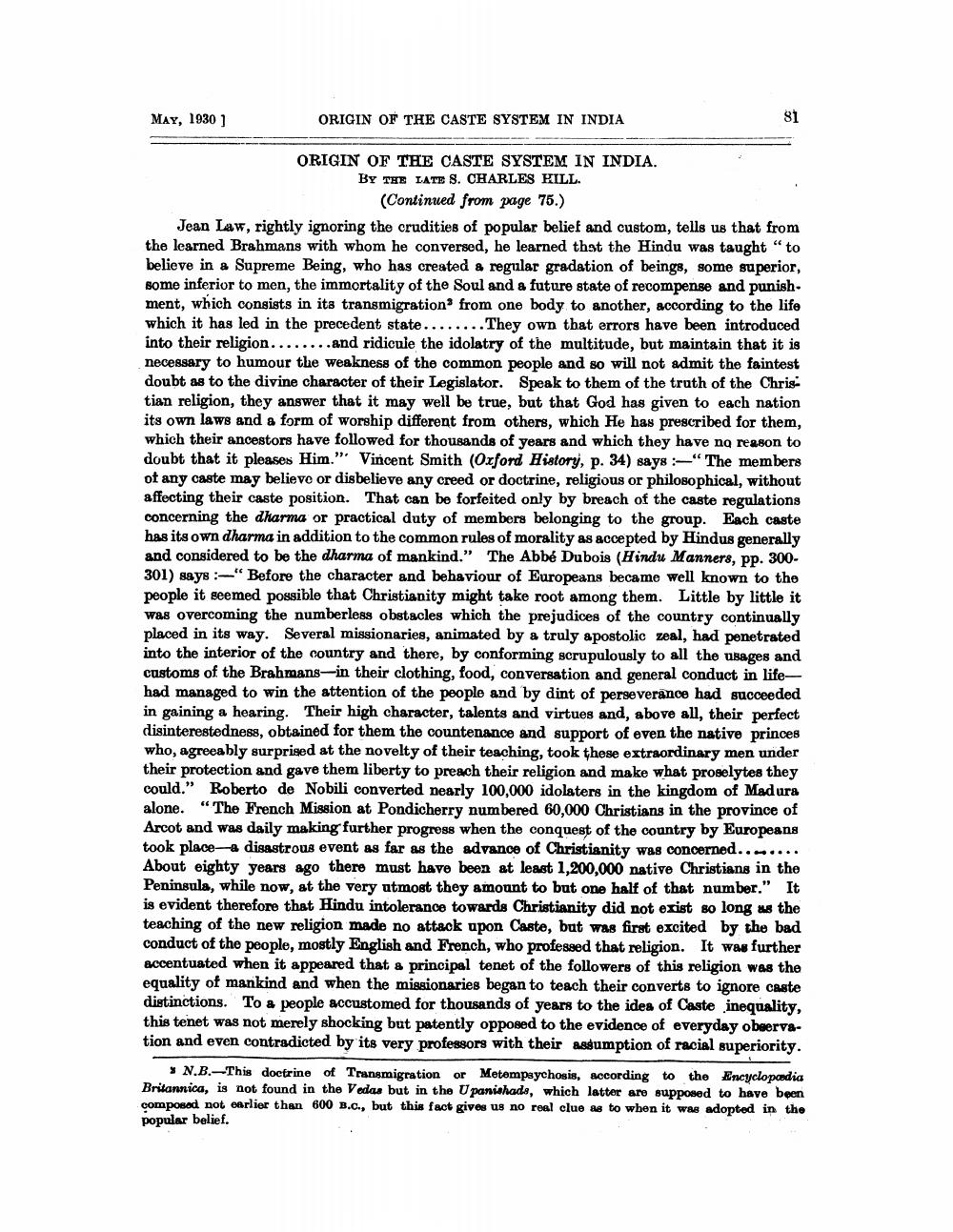________________
MAY, 1930 ]
ORIGIN OF THE CASTE SYSTEM IN INDIA
ORIGIN OF THE CASTE SYSTEM IN INDIA.
BY THE LATE S. CHARLES HILL.
(Continued from page 75.) Jean Law, rightly ignoring the crudities of popular belief and custom, tells us that from the learned Brahmans with whom he conversed, he learned that the Hindu was taught "to believe in a Supreme Being, who has created & regular gradation of beings, some superior, some inferior to men, the immortality of the Soul and a future state of recompense and punishment, which consists in its transmigration from one body to another, according to the life which it has led in the precedent state........ They own that errors have been introduced into their religion........and ridicule the idolatry of the multitude, but maintain that it is necessary to humour the weakness of the common people and so will not admit the faintest doubt as to the divine character of their Legislator. Speak to them of the truth of the Chris. tian religion, they answer that it may well be true, but that God has given to each nation its own laws and a form of worship different from others, which He has prescribed for them, which their ancestors have followed for thousands of years and which they have no reason to doubt that it pleases Him." Vincent Smith (Oxford History, p. 34) says "The members of any caste may believo or disbelieve any creed or doctrine, religious or philosophical, without affecting their caste position. That can be forfeited only by breach of the caste regulations concerning the dharma or practical duty of members belonging to the group. Each caste has its own dharma in addition to the common rules of morality as accepted by Hindus generally and considered to be the dharma of mankind." The Abbé Dubois (Hindu Manners, pp. 300301) gays :"Before the character and behaviour of Europeans became well known to the people it seemed possible that Christianity might take root among them. Little by little it was overcoming the numberless obstacles which the prejudices of the country continually placed in its way. Several missionaries, animated by a truly apostolic zeal, had penetrated into the interior of the country and there, by conforming scrupulously to all the usages and customs of the Brahmans in their clothing, food, conversation and general conduct in lifehad managed to win the attention of the people and by dint of perseverance had succeeded in gaining a hearing. Their high character, talents and virtues and, above all, their perfect disinterestedness, obtained for them the countenance and support of even the native princes who, agreeably surprised at the novelty of their teaching, took these extraordinary men under their protection and gave them liberty to preach their religion and make what proselytes they could." Roberto de Nobili converted nearly 100,000 idolaters in the kingdom of Madura alone. "The French Mission at Pondicherry numbered 60,000 Christians in the province of Arcot and was daily making further progress when the conquest of the country by Europeans took place disastrous event as far as the advance of Christianity was concerned....... About eighty years ago there must have been at least 1,200,000 native Christians in the Peninsula, while now, at the very utmost they amount to but one half of that number." It is evident therefore that Hindu intolerance towards Christianity did not exist so long as the teaching of the new religion made no attack upon Caste, but was first excited by the bad conduct of the people, mostly English and French, who professed that religion. It was further accentuated when it appeared that a principal tenet of the followers of this religion was the equality of mankind and when the missionaries began to teach their converts to ignore caste distinctions. To a people accustomed for thousands of years to the idea of Caste inequality, this tenet was not merely shocking but patently opposed to the evidence of everyday observation and even contradicted by its very professors with their assumption of racial superiority.
* N.B.-This doctrine of Transmigration or Metempsychosis, according to the Encyclopedia Britannica, is not found in the Vedas but in the Upanishads, which latter are supposed to have been composed not earlier than 600 B.C., but this fact gives us no real clue as to when it was adopted in the popular belief.




